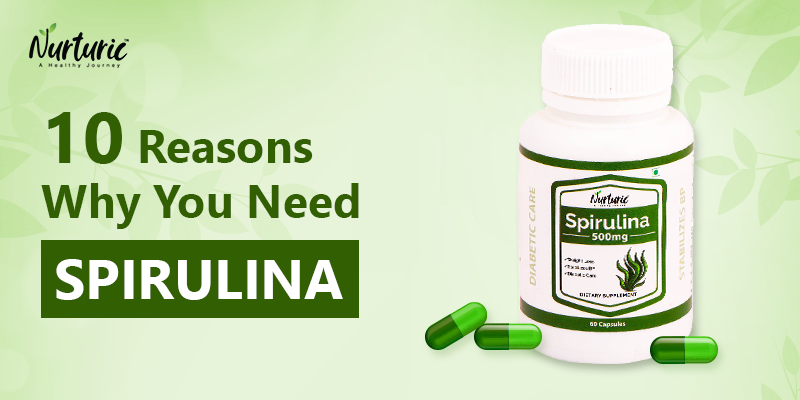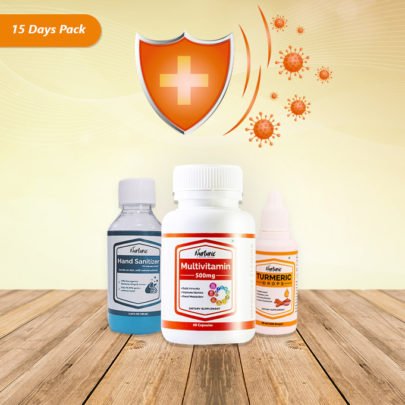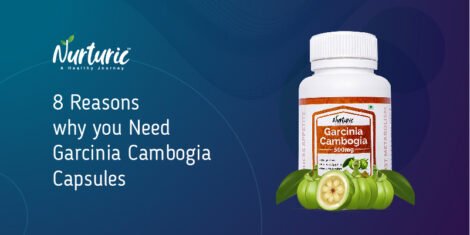- You have no items in your shopping cart
- Subtotal: ₹0.00
You might have heard a lot of buzz about seafood veggies, and for a good reason, these unique veggies offer all kinds of notable nutritional benefits. Algae species number over 30,000 in our oceans, ponds, and lakes. Some of them, such as green algae, are classified as plants. Others, such as spirulina, are members of a class of microorganisms known as cyanobacteria, blue-green algae. 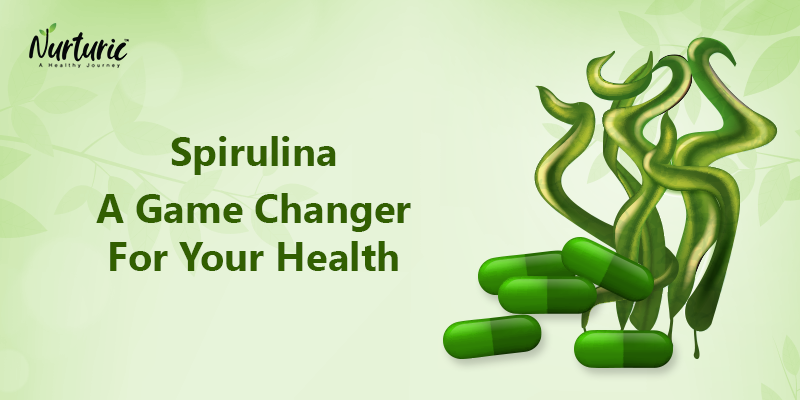 Spirulina, technically called cyanobacteria, a bluish pigment, has been on the Earth for over 2 billion years. It is a simple hydrocarbon vegetable made directly from photosynthesis and used since the 16th century. It sounds much better than pond scum, a kind of blue-green algae naturally grown under extreme conditions, oceans and salty lakes, and many other water-resident organisms find it inhospitable. Now let us talk about what spirulina is and the benefits of taking spirulina.
Spirulina, technically called cyanobacteria, a bluish pigment, has been on the Earth for over 2 billion years. It is a simple hydrocarbon vegetable made directly from photosynthesis and used since the 16th century. It sounds much better than pond scum, a kind of blue-green algae naturally grown under extreme conditions, oceans and salty lakes, and many other water-resident organisms find it inhospitable. Now let us talk about what spirulina is and the benefits of taking spirulina.
What is Spirulina? Why Do You Need It
Spirulina is bluish-green algae and one of nature’s most powerful and nutrient-dense food with the highest and most digestible source of protein among all the vegetables. The blue-green algae played a vital role in producing oxygen that allowed the planet’s earliest life forms to develop billions of years ago.  Spirulina, also known as cyanobacteria, is a bluish phycocyanin pigment used to capture light for photosynthesis. As a result, spirulina contains chlorophyll, which is a highly beneficial enzyme. Now that you have seen what spirulina is, read on to know more about it.
Spirulina, also known as cyanobacteria, is a bluish phycocyanin pigment used to capture light for photosynthesis. As a result, spirulina contains chlorophyll, which is a highly beneficial enzyme. Now that you have seen what spirulina is, read on to know more about it.
10 Reasons Why You Need Spirulina
Spirulina is the oldest form of life that has high concentrations of amino acids, phytonutrients, proteins, iodine and gamma-linolenic acid (GLA), helpful in preventing metabolic syndrome. It contains anti-cancer, anti-fungal and anti-inflammatory properties, and it improves sinus issues and boosts energy. 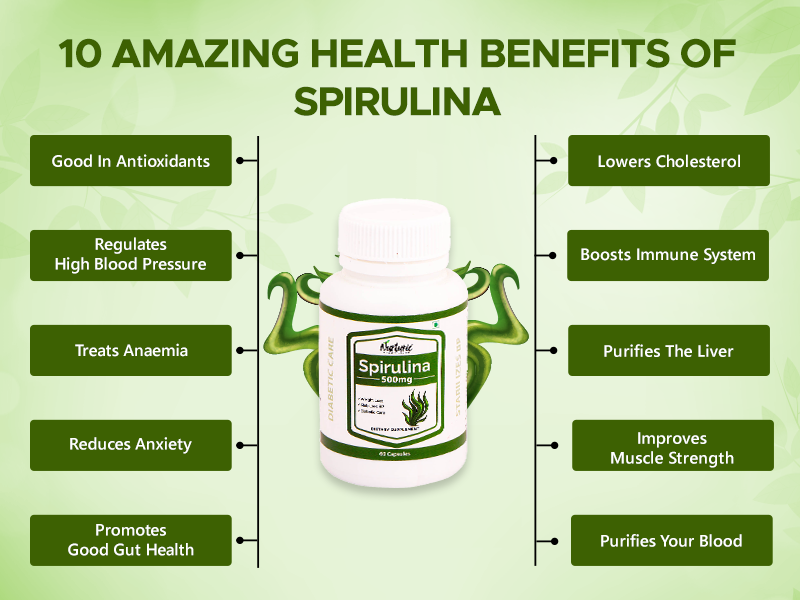 We don’t focus much on ourselves because of our hectic lifestyle, and we forget the most important aspect – re-energizing our bodies. Even if you eat a large portion of a meal, the nutrition may be insufficient. Inadequate nutrition causes fatigue, lack of concentration, lifestyle diseases, and a shortened life. This is why we require Spirulina, as it will aid in nutritional balance. Let’s dig deeper into the benefits.
We don’t focus much on ourselves because of our hectic lifestyle, and we forget the most important aspect – re-energizing our bodies. Even if you eat a large portion of a meal, the nutrition may be insufficient. Inadequate nutrition causes fatigue, lack of concentration, lifestyle diseases, and a shortened life. This is why we require Spirulina, as it will aid in nutritional balance. Let’s dig deeper into the benefits.
Good In Antioxidants
The body produces antioxidants, and some are found in food. Antioxidants are compounds that slow the progression of DNA damage, which leads to cancer and other chronic diseases. The phytonutrients in spirulina have strong antioxidant properties that help cells protect them from the harmful effects of reactive oxygen radicals. In addition to antioxidant properties, phycocyanin is responsible for the vibrant blue-green colour of spirulina.
Regulates High Blood Pressure
Nowadays, most people suffer from hypertension, known as the silent killer, as it does not cause symptoms. It can devastate your body, causing everything from cardiac arrest to kidney failure. Fortunately, spirulina can aid in the treatment of high blood pressure. Spirulina, an antioxidant, boosts nitric oxide production, a constituent that aids in the dilation of blood vessels.
Treats Anaemia
Anaemia is a common condition that occurs when there are not sufficient red blood cells to transport oxygen throughout the body. Spirulina contains a highly available form of iron, which is unusual for a plant. Phycocyanin boosts haemoglobin and red blood cells, which improves immune function and transports oxygen to tissues throughout the body.
Reduces Anxiety
Serotonin levels are lower in people suffering from mental illnesses such as depression and anxiety. Spirulina is a powerhouse of nutrients and delivers 20 amino acids. Tryptophan is an amino acid that helps reduce the production of serotonin levels which plays an important role in mental wellbeing. It treats mood disorders, depression and stress, uplifting the spirits.
Lowers Cholesterol
If you’re looking for a natural way to lower your LDL cholesterol, you should consider spirulina. The major part of fat accumulation in the body is caused by oxidative damage. As a result, spirulina capsules may be able to control lipid peroxidation. It may also aid in the reduction of LDL (bad lipid) oxidation, thereby supporting healthy heart functions.
Boosts Immune System
Do you know how having houseplants can help you breathe better? Plants aren’t the only greens that can have that effect; these vividly coloured algae can, too. A wide range of micronutrients are required for our immune system to function correctly, and many of them come from a significant source of spirulina. Spirulina contains an antioxidant called phycocyanin, which fights off anything that could harm your cells. If everyone around you appears to be sick, adding some extra spirulina to your diet won’t hurt in terms of providing additional protection for your immune cells.
Promotes Good Gut Health
Our gut is essential to our health because it supports our immune system, aids in digesting certain foods, and even provides us with nutrients that our bodies cannot synthesise. However, for the gut to function correctly, we must give it the nutrients it requires through the food we eat. Eating spirulina is beneficial because it is good for healthy gut microorganisms like Lactobacillus.
Purifies The Liver
The liver serves several important functions in our bodies. It detoxifies and protects the body from harmful substances. Spirulina is a storehouse of nutrients essential for maintaining a healthy liver, boosting the number of antioxidants in the liver, and lowering liver toxicity. In addition, It suppresses the growth of hepatic stellate cells, which cause liver damage and fibrosis.
Improves Muscle Strength
Do you engage in regular exercise? Spirulina contains 65% proteins and nutrients, which are important for muscle builders who want to eat a high-protein diet. Athletes who consume spirulina regularly do not tire as easily when lifting weights as those who do not.
Purifies Your Blood
Spirulina is a blood purifier that promotes the growth of red blood cells while also reenergizing the existing blood supply. It promotes healthy blood flow and helps the lymphatic system remove harmful toxins, thus purifying the blood. One of the most crucial substituents of spirulina is chlorophyll, which plays a vital role in cleaning the blood and transporting oxygen to cells.
You have learned the spirulina tablets benefits. Now let us talk about the uses of spirulina capsules and what conditions they can treat.
Who Needs It? Which Conditions Can It Treat or Prevent?
The gap between demand and food supply has been gradually expanding in recent years, and the balance now favours demand due to population growth. Several hundred million people are malnourished, according to the WHO. Spirulina provides the body with several essential micronutrients. It contains anti-cancer, anti-fungal and anti-inflammatory properties, and it improves sinus issues and boosts energy. They can treat various conditions like
- Candida
- Measles
- Mumps
- Influenza A
- Herpes
- Menopausal symptoms
Spirulina is one of the oldest known fossils and provides numerous health benefits. If you want to feel healthier quickly, incorporate this miracle seafood for added benefits. We’ve talked about the spirulina health benefits and precautions to take while consuming spirulina capsules. Are there any risks or side effects from taking these supplements? Let us find out!
We’ve talked about the spirulina health benefits and precautions to take while consuming spirulina capsules. Are there any risks or side effects from taking these supplements? Let us find out!
Possible Side Effects
Spirulina is a safe and highly digestible superfood when it is consumed in moderation. The dosage and source from which it is obtained determine the possibility of side effects. Here are some of the possible side effects of spirulina capsules.
- Stomach problems
- Muscle weakness
- Liver damage
- Thirst
- Heart palpitations
- Difficulty in breathing
These are some of the common side effects associated with spirulina. If you notice any symptoms we have discussed, refrain from consuming them and consult your doctor.
These were the spirulina benefits and side effects. Let us see how spirulina can contribute to your health.
Nutritional Information and Ingredients – Background
Spirulina has high concentrations of amino acids, phytonutrients, proteins, iodine and gamma-linolenic acid (GLA), helpful in preventing metabolic syndrome. Spirulina has an array of antioxidants, vitamins, and minerals containing 26 times milk calcium and 60% protein. A kilogram of Spirulina is found to be equivalent to a quintal of various vegetables. In addition, it is the richest source of beta carotene and vitamin B12 and contains 20 essential amino acids, enzymes and minerals.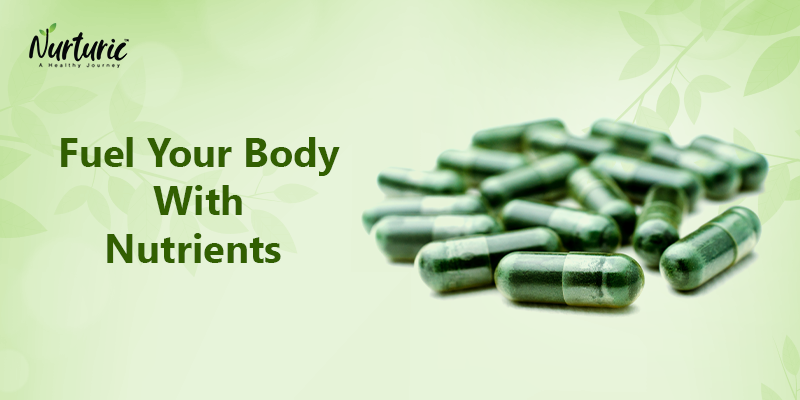 Dried spirulina contains 5% water, 24% carbohydrates, 8% fat, and approximately 60% protein. protein:57.47g, 23.9g carbohydrate. Spirulina does not contain vitamin B12, as is commonly claimed. It contains a form of vitamin B12 that is ineffective in humans. The aqueous extract of Spirulina platensis demonstrated the greatest wound healing activity. Now that we have learned about the spirulina capsule uses and nutrients, let’s discuss how to choose the best supplement to reap all the health benefits.
Dried spirulina contains 5% water, 24% carbohydrates, 8% fat, and approximately 60% protein. protein:57.47g, 23.9g carbohydrate. Spirulina does not contain vitamin B12, as is commonly claimed. It contains a form of vitamin B12 that is ineffective in humans. The aqueous extract of Spirulina platensis demonstrated the greatest wound healing activity. Now that we have learned about the spirulina capsule uses and nutrients, let’s discuss how to choose the best supplement to reap all the health benefits.
How to Choose the Right Supplement and Where to Buy It From
Spirulina can be taken as tablets, drops or as powder. There are dietary supplements available in stores, and several brands claim that their products are the best in the market, but not all the products are worth it. It is important to check that the supplements have been tested for pollutants safely, and the origin is clearly stated on the label. Check whether the capsule is free from lead, arsenic and mercury. Ensure that the supplements are legitimate, 100% certified organic and extracted from the source grown naturally. If you are looking for a 100% organic certified product with no side effects, you can buy Nurturic spirulina capsules or drops that guarantee high quality and genuine products.
If you are looking for a 100% organic certified product with no side effects, you can buy Nurturic spirulina capsules or drops that guarantee high quality and genuine products.
Our Take
Spirulina is trendy and authentic right now. This wonder food has a slew of other health benefits, and it is one of nature’s best disease-fighting and anti-ageing gifts to humankind. Make it a part of your diet today!
FAQ’s
1. How much Spirulina should you take?
It is recommended to take 1000-1500 mg per day (2-3 capsules) per day. Since it is pure and organic, you may safely take more to suit your personal health program.
2. What is the best time to take spirulina?
High-protein foods have been found to increase alertness, and Spirulina is the richest whole food source of protein. So, take Spirulina at least four hours before bed.
3. Is spirulina good for skin?
Yes. It detoxifies the body and improves the skin’s natural radiance. When consumed daily, spirulina can cure acne-prone skin, remove blemishes, reduce pigmentation and slow down ageing.
4. Who should avoid consuming spirulina?
It is recommended to consult your doctor before beginning a supplement regimen if you are pregnant, breastfeeding, or taking medications.
5. What does spirulina do to the body?
Spirulina is high in nutrients, vitamins and minerals, necessary for a healthy immune system. It boosts the production of white blood cells and antibodies and fights viruses and bacteria in the body.
6. Is spirulina safe for kidneys?
Yes. It is safe if you take it in moderation. But If you are susceptible to gout attacks or kidney stones, then spirulina may be harmful to you.
7. What does spirulina do to your stomach?
Spirulina is an effective antimicrobial, especially against candida, which means it slows the progression of harmful bacteria and eliminates them.
8. How much protein can I get from spirulina?
Spirulina offers 71% protein, which consists of all essential amino acids required for the body.
9. Is spirulina vegan?
Absolutely. Spirulina is a microscopic plant that is grown under extreme conditions, oceans and salty lakes. It does not contain or come in contact with any animals or animal byproducts.
10. Is Spirulina safe during pregnancy?
Yes! Many women even increase dosage during pregnancy. But it is recommended to consult your doctor before you incorporate it into your daily regimen.

